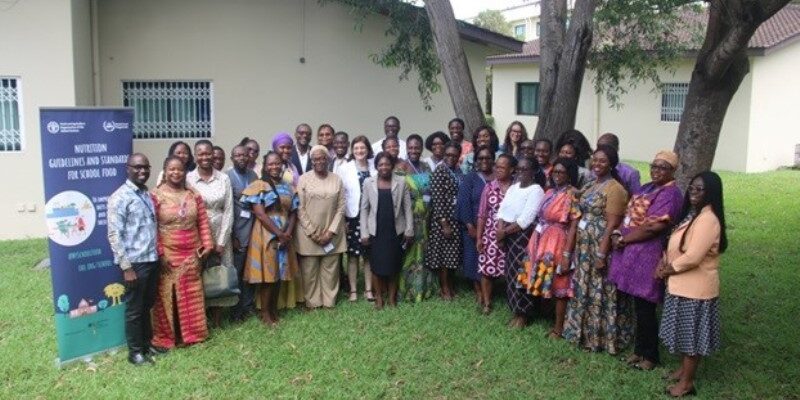Introduction
Ensuring access to nutritious food is a fundamental human right, particularly for children and adolescents. The School Meals Coalition aims to provide every schoolchild with a healthy daily meal by 2030. Recognizing this, Ghana has actively promoted child nutrition through initiatives such as the Ghana School Feeding Programme (GSFP). However, the country lacks a formal Nutrition Guidelines and Standards (NGS) framework to guide school meal quality and ensure meals meet students’ dietary needs.
To address this gap, a stakeholder workshop was organized from May 7th to 9th, 2024, in Accra, Ghana, bringing together representatives from government, civil society, academia, and the private sector. The workshop sought to establish consensus on key components of the NGS and validate a proposed framework.
Picture of workshop Participants
Objectives of the Workshop
The primary aim of the workshop was to establish a preliminary set of food and nutrient targets and provide recommendations to enhance mealtime experiences in Ghanaian schools. Specific objectives included:
- Validating baseline assessment findings on school meals.
- Gathering stakeholder input to refine preliminary school meal Nutrition Guidelines and Standards (NGS).
- Testing the applicability of the FAO-WFP global methodology for setting NGS.
Workshop Format
The workshop followed a three-session structure, each focusing on key components of school meal guidelines and feasibility assessments:
- Day 1 & 2 (Session 1): Setting the Scene and Reviewing Assessment Findings.
- Day 2 (Session 2): Reviewing the NGS Proposal and Feasibility of Implementing Standards.
- Day 3 (Session 3): Developing a Roadmap for Institutionalizing the NGS in Ghana.
Day 1: Setting the Scene and Reviewing Assessment Findings
Opening Ceremony
The workshop was officially opened by representatives from key institutions, including:
- Food and Agriculture Organization (FAO)
- World Food Programme (WFP)
- Ghana School Feeding Programme (GSFP)
- Ghana Health Service (GHS)
- Ghana Education Service (GES)
They emphasized the urgent need for structured guidelines and policies to enhance the quality of school meals.
Baseline Assessments and Findings
Findings from key baseline studies were presented and discussed:
- Dietary Intake Assessment:
- Conducted in three municipalities (Kintampo North, Kassena-Nankana, and Hohoe).
- Found high nutrient inadequacy, especially in calcium, iron, and zinc.
- Low fruit consumption was reported.
- Qualitative Study on School Meals:
- Schoolchildren expressed dissatisfaction with meal portion sizes and quality.
- Limited awareness of GSFP among teachers.
- Desire for fruit inclusion in school meals.
- School Food Environment Study:
- Found discretionary foods (biscuits, sugary drinks, fried foods) were widely available.
- Most food vendors inside school premises sold low-nutrient competitive foods.
Stakeholder Discussions and Feedback
Participants identified gaps in the GSFP, including delays in funding, poor meal quality, and lack of proper infrastructure. They emphasized the need for increased local food sourcing and improved oversight of caterers.
Day 2: NGS Proposal and Feasibility
Key Discussions and Adjustments to NGS
Stakeholders reviewed the proposed NGS objectives and made revisions:
- Energy and Nutrient Targets:
- The original proposal aimed to progressively improve school meals.
- Stakeholders removed “progressively” and set a 2030 target for full implementation.
- Food-Based Targets:
- Focus on local food systems and seasonal foods.
- Stakeholders suggested aligning meals with Ghana’s Food-Based Dietary Guidelines (FBDG).
- Meal Enjoyment & Learning Component:
- Mealtime should be an enjoyable and educational experience.
- Stakeholders recommended structured meal breaks and better meal presentation.
Cost and Feasibility Assessment
A cost-modelling study showed that:
- Increasing meal diversity and quality required a higher budget allocation.
- Without budget increases, meal quality would decline due to inflation.
- If school feeding funding is raised to GHS 1.50 per meal, meal quality significantly improves.
Stakeholders emphasized the importance of budgeting for inflation to sustain meal quality.
Day 3: Institutionalizing NGS and Looking Ahead
Legal and Institutional Considerations
- The Ghana School Feeding Programme (GSFP) currently lacks legal backing.
- A School Feeding Bill was proposed to clarify roles, responsibilities, and funding mechanisms.
- Participants called for increased involvement of Parent-Teacher Associations (PTAs).
Capacity Strengthening for NGS Implementation
A capacity needs assessment was conducted, highlighting:
- The need for stronger government commitment and financial support.
- The importance of training caterers to enhance meal quality.
- The role of local farmers in supporting the school feeding program.
Next Steps & Recommendations
- Pilot-Test the Revised NGS – Ensure feasibility before nationwide implementation.
- Strengthen Funding Mechanisms – Increase school feeding budget to accommodate inflation.
- Develop a Legal Framework – Establish a School Feeding Bill to institutionalize NGS.
- Enhance Monitoring & Accountability – Improve oversight of meal preparation and vendor selection.
- Promote Community Engagement – Strengthen the role of PTAs and local farmers in meal planning.
The School Food Nutrition Guidelines and Standards (NGS) Workshop was a significant milestone in improving school feeding in Ghana. Stakeholders validated key assessment findings, revised proposed guidelines, and outlined practical steps for implementation. The success of the NGS will depend on strong government commitment, multi-sector collaboration, and sustainable financing.
Moving forward, continued stakeholder engagement, advocacy, and policy action will be essential in realizing the goal of providing nutritious, high-quality school meals to all Ghanaian children.



